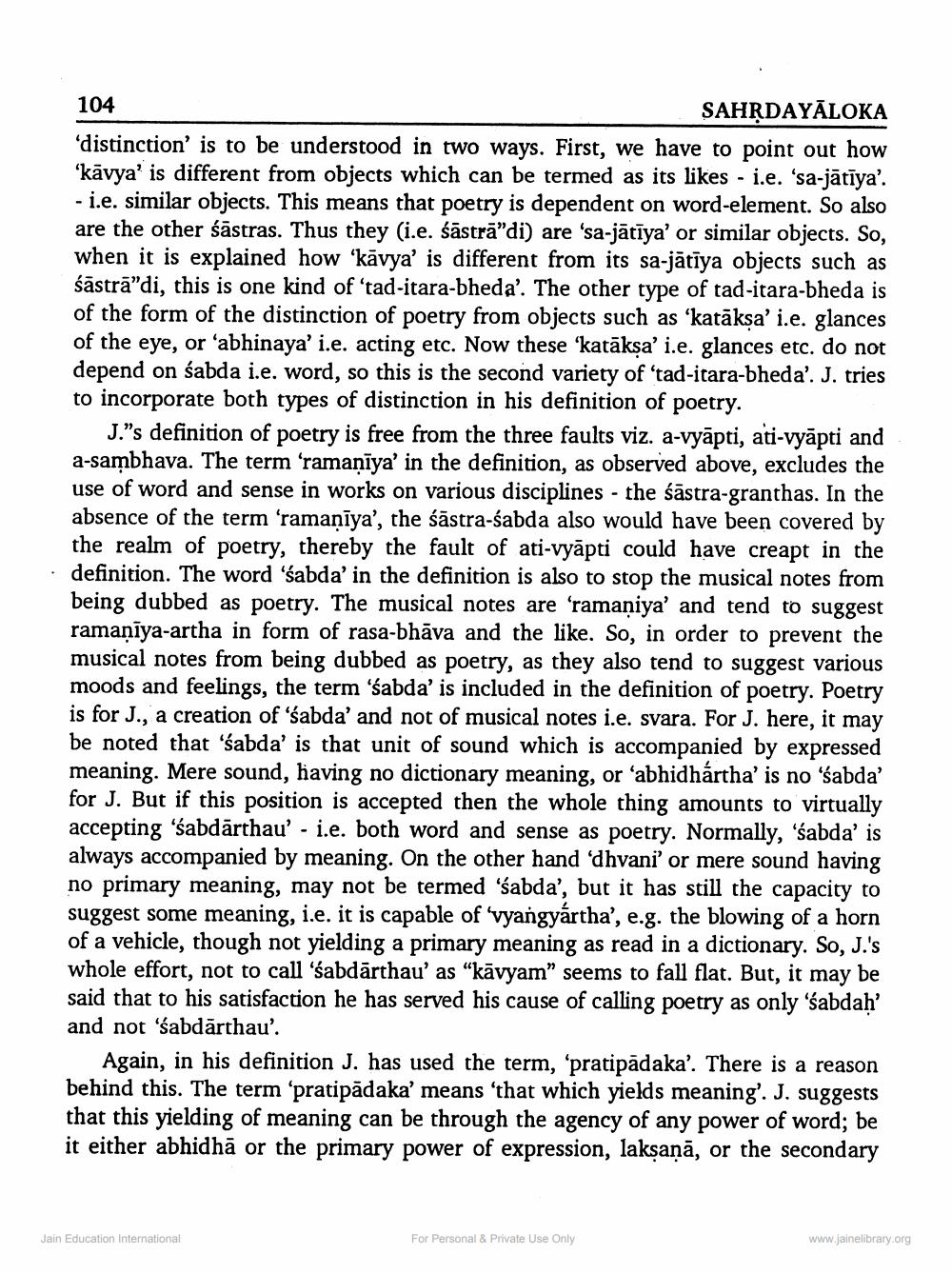________________
104
SAHRDAYĀLOKA
distinction is to be understood in two ways. First, we have to point out how kāvya' is different from objects which can be termed as its likes - i.e. 'sa-jātiya'. - i.e. similar objects. This means that poetry is dependent on word-element. So also are the other śāstras. Thus they (i.e. śāstrā”di) are 'sa-jātīya' or similar objects. So, when it is explained how ‘kāvya’ is different from its sa-jātīya objects such as śāstrā”di, this is one kind of 'tad-itara-bheda'. The other type of tad-itara-bheda is of the form of the distinction of poetry from objects such as ‘katāksa' i.e. glances of the eye, or 'abhinaya' i.e. acting etc. Now these 'katāksa' i.e. glances etc. do not depend on sabda i.e. word, so this is the second variety of 'tad-icara-bheda'. J. tries to incorporate both types of distinction in his definition of poetry.
J.”'s definition of poetry is free from the three faults viz. a-vyāpti, ati-vyāpti and a-sambhava. The term 'ramanīya' in the definition, as observed above, excludes the use of word and sense in works on various disciplines - the śāstra-granthas. In the absence of the term 'ramanīya', the śāstra-śabda also would have been covered by
the realm of poetry, thereby the fault of ati-vyāpti could have creapt in the · definition. The word 'sabda' in the definition is also to stop the musical notes from
being dubbed as poetry. The musical notes are 'ramaniya' and tend to suggest ramanīya-artha in form of rasa-bhāva and the like. So, in order to prevent the musical notes from being dubbed as poetry, as they also tend to suggest various moods and feelings, the term 'sabda' is included in the definition of poetry. Poetry is for J., a creation of 'sabda' and not of musical notes i.e. svara. For J. here, it may be noted that 'sabda' is that unit of sound which is accompanied by expressed meaning. Mere sound, having no dictionary meaning, or ‘abhidhártha' is no 'śabda' for J. But if this position is accepted then the whole thing amounts to virtually accepting 'sabdārthau' - i.e. both word and sense as poetry. Normally, 'sabda' is always accompanied by meaning. On the other hand 'dhvani' or mere sound having no primary meaning, may not be termed 'sabda', but it has still the capacity to suggest some meaning, i.e. it is capable of vyangyártha', e.g. the blowing of a horn of a vehicle, though not yielding a primary meaning as read in a dictionary. So, J.'s whole effort, not to call 'sabdārthau' as “kāvyam" seems to fall flat. But, it may be said that to his satisfaction he has served his cause of calling poetry as only 'sabdaḥ and not 'śabdārthau'.
Again, in his definition J. has used the term, 'pratipadaka'. There is a reason behind this. The term 'pratipădaka' means 'that which yields meaning'. J. suggests that this yielding of meaning can be through the agency of any power of word; be it either abhidhā or the primary power of expression, laksanā, or the secondary
Jain Education International
For Personal & Private Use Only
www.jainelibrary.org




